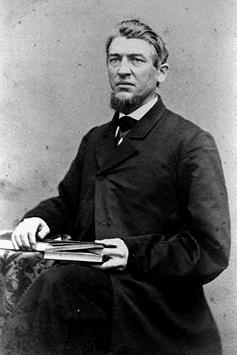 |
 |
| M. E. Cornell—White Estate. |
|
Inappropriate Friendship Fosters Division
by John Loughborough
An experience came to us in January, 1872, which served to confirm
the faith of that young [San Francisco] church in the spirit
of prophecy. Elder Cornell persisted in an independent course
which I felt would bring reproach upon himself and upon the cause.
Innocent as it seemed, he conducted himself injudiciously with
a lady of the congregation, showing partiality
which aroused comment among the enemies of the faith. Although
far from the borders of immorality, I reasoned with him that
he should shun every appearance of evil. He said it was nobody's
business, and that he could walk the streets with whomever he
pleased. The older church members saw the evil of his waywardness
and were ready to subject him to censure, but the younger ones
sided with him.
Thus the matter stood on Sabbath, Jan. 27, when it was decided
than an investigation must be made and action taken. To all
appearances a division in the church was inevitable. A meeting
was appointed for 9 a.m. Sunday morning. I spent much of the
night in prayer. On the morning of the 28th, as I started out
for the meeting, I met my fellow-laborer on the sidewalk, near
my boarding place, weeping. He said, "Brother Loughborough,
I am not going to that meeting today."
"Not going to the meeting?" I asked in astonishment. "Why, that
meeting relates to your case!"
"I know," he said, "but I am all wrong. You are right in the
position you have taken in reference to me. Here is a letter
of confession I have written to the church. It is better that
you read it to them, and better for those who might sympathize
with me if I were not there."
"But what has happened to make such a great change since yesterday?"
I inquired.
He explained, "I went to the post office last night after the
Sabbath, and received a letter from Sister White," he said handing
me the letter. "Tell the church I accept it as a testimony from
God, and that I repent."
"I was shown, Brother Cornell, that you should be very circumspect
in your deportment and in your words; you are watched by enemies.
You have great weakness for a man that is as strong to move
the crowd as you are. Separated from your wife as you are, suspicion
and jealousy will frame falsehood if you give no occasion; but
if you are careless, you will bring a reproach upon the cause
of God which would not soon be wiped away. Satan is tempting
you to make a foolish man of yourself. Now is your opportunity
to show yourself a man, to [exhibit] the grace of God by your patience,
your fortitude and courage. Be careful how you are enticed to
make women your confidants, or to allow them to make you their
confidant. Keep aloof from the society of women as much as you
can; you will be in danger."
But we must go back. This counsel came to Sister White in a
vision shown her on Dec. 10, 1871, while traveling in Vermont.
She began to write out the part relating to Elder Cornell on
Dec. 27, but she did not complete it at that time. Early on
the morning of Jan. 18, 1872, she awoke with the impression,
"Write out immediately the testimony for California and get it
in the very next mail. It is needed." Then the impression came
a second time. She arose quickly and completed the letter.
Before breakfast she handed it to her son Willie saying, "Take
the letter to the post office, but do not put it in the drop.
Hand it to the postmaster, and have him be sure to put it in
the mail bag that goes out this morning."
At that time it required nine days for overland mail between
Michigan and California. Had the letter arrived a day later,
there would doubtless have been a sad rupture in the church.
Had it come several days earlier, the church would not so readily
have seen its force. Our members in San Francisco saw at once
that no person on the west coast could have communicated that
information to Mrs. White in time for her to write that letter,
for the state of things which had developed did not then exist.
The perfect timing of the counsel confirmed the church in the
Spirit of Prophecy.
(Miracles in My Life, pp. 82-84)
|



